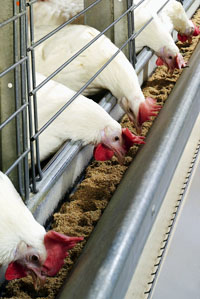DEFRA confirms no birds in conventional cages from 2012

There will be no birds in conventional cages in the UK after 1 January 2012. That is the message that came out of DEFRA during the past month.
Any hopes that birds already housed in conventional cages by that date, would be allowed to complete the 52-week laying cycle well into 2012, were dashed in a detailed letter to industry leaders at the start of August from government minister Jim Fitzpatrick. It now means that the latest effective date for housing new flocks in conventional cages will be December 2010, or just 15 months from now, if producers want to achieve a full year’s production.
But Mr Fitzpatrick also promised that the government would seek to protect the UK industry from producers in other member states if they chose to interpret the rules differently and allow birds to remain in cages up to the end of 2012.
Industry figures have voiced their concern at the announcement. British Egg Industry Council chief executive Mark Williams said he was “disappointed” at DEFRA’s response and claimed that an intra-EU trade ban on eggs produced from conventional cages after this date would be vital.
“We will be holding the government to account on this one,” he promised.
At UKEP, David Spackman predicted an egg shortage in the UK in 2012 and said: “In spite of numerous communications from the industry, and even a damning forecast from ADAS, DEFRA remains resolutely opposed to changes which could ease the situation.”
In his letter to the industry, Mr Fitzpatrick said: “Given our commitment to the ban, I am unable to support industry’s request that we interpret the legislation in a way that could effectively give producers an extra year in which to comply. This measure would greatly disadvantage those in the industry who have already moved away from conventional cages, as they would risk being undercut by other producers allowed to continue production more cheaply in conventional cages.”
He went on: “However, if any other member states are allowed additional time to phase out conventional cages, the government will press the Commission to act so as not to disadvantage those UK producers who have already converted out of conventional cages. This could be by way of an intra-community trade ban on eggs produced by hens housed in conventional cages after 1 January 2012, so they may only be sold in the member state of production.”
He also confirmed that DEFRA would seek a code “4” to distinguish eggs produced by hens in enriched systems, but rejected the idea of changing the name from “enriched cage” to “enriched colony”, as this could “mislead” consumers, although he offered to discuss alternatives with the industry.
Mr Williams forecasted a shortfall of between 2m and 4m hens in the UK if the deadline was enforced and believed it was inevitable that many other EU member states would fail to meet the 2012 deadline.
“There are still 240m hens sitting in conventional cages in Europe today and there’s no way that they’re going to be moved by 1 January 2012. The Commission knows that, governments know that.
“It’s my belief that what will happen, come 2012, is they will have to give more time. And if the UK has decided it isn’t going to give its industry more time, we’re simply saying ‘what are you going to do about protecting those producers in the UK who’ve made the investment’?
“I haven’t got a problem if certain member states need more time, as long as those eggs stay within their own borders.”
He acknowledged that an intra-EU trade ban would impinge on the Single Market, but continued: “If welfare is so important to consumers as the politicians lead us to believe it is, then they should act.
“They’ve basically got to deliver to us now, if they want our industry to remain at the forefront of Europe as it has done.”
